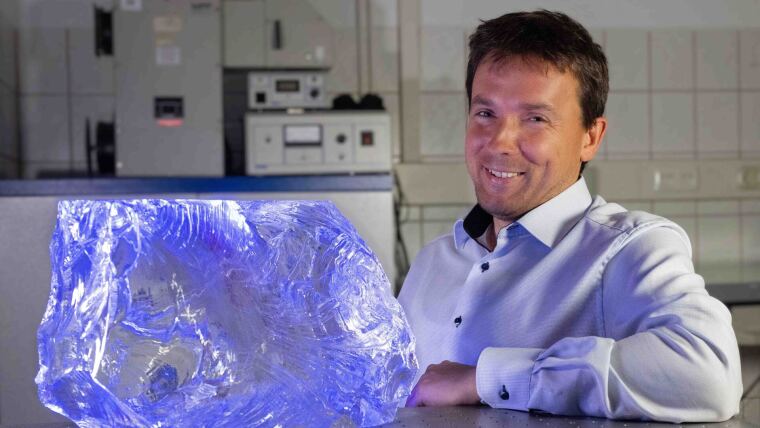
- Awards and Personnel
Published: | By: Marco Körner
Materials scientist Lothar Wondraczek of Friedrich Schiller University Jena, as part of an international research team, has been awarded the prestigious Dalton Horizons Prize by the Royal Society of Chemistry (UK). The researchers are being honoured for the discovery of novel hybrid glasses that can, for instance, serve as membrane materials for the separation of different gases.
Order in Disorder
“For me, this honour primarily represents a significant recognition of our work—both in collaboration with scientists from all corners of the globe and within our group here in Jena,” explains Lothar Wondraczek, who holds the Chair of Glass Chemistry at the Otto Schott Institute of Friedrich Schiller University Jena. “Glasses remain an exciting class of materials,” he adds, explaining, “They can now be described quite well, for example in terms of their chemical constituents and the spatial arrangement of those constituents. On the other hand, classical glasses offer only a few degrees of freedom for actually influencing that structure—quite unlike what is possible, for example, in organic or macromolecular chemistry. It is precisely this boundary that the so-called hybrid glasses can now overcome.”
Hybrid glasses combine the possibilities of generating complex structures of so-called metal-organic frameworks (MOFs) with classical glass properties, such as the excellent formability of glass. “MOFs have very interesting potential applications, but they are usually initially synthesised only as powders,” Wondraczek continues. “Together with our cooperation partners, we are alternatively investigating the meltability of these powders—without thermal decomposition—and the subsequent generation of complex shapes as required for concrete applications. For example, we were able to manufacture an optical lens whose refractive properties depend on which gases are currently present in the surrounding environment.”
Honouring Excellent International Teamwork
The Dalton Horizons Prize is awarded in recognition of significant discoveries or advances in the field of inorganic chemistry. “Teamwork is of particular importance; the prize is explicitly awarded to international research teams,” explains Wondraczek. “In our case, that involved no fewer than 17 researchers from ten countries.”
Special thanks go to Professor Thomas Douglas Bennett, who conducted research at Friedrich Schiller University Jena under the Excellence Fellowship programme in 2022 and 2023 and now teaches at the University of Canterbury in New Zealand. “Professor Bennett not only significantly advanced this field of research but essentially opened it up for many of us in the first place,” adds Wondraczek, “and from those early studies there has now emerged an outstandingly networked international research field. We regard the prize as a great motivation to continue along this path in the future.”